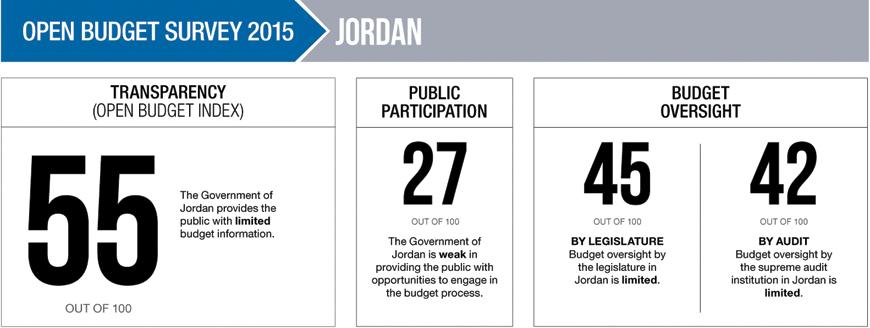You are here
Kingdom ranked among top budget transparent in region
By Dana Al Emam - Sep 14,2015 - Last updated at Sep 14,2015
AMMAN — Although Jordan’s ranking in budget transparency is “moderately higher” than the global average, the availability of budget information to the public is still “limited”, according to a recent international report.
The Open Budget Survey 2015, carried out by the International Budget Partnership, evaluated 102 countries concerning budget transparency, public participation and independent oversight.
The survey uses 109 indicators to measure budget transparency, whether the government makes eight key budget documents available to the public in a timely manner and whether the data in these documents are comprehensive and useful.
On a scale of 100, Jordan scored 55 in budget transparency, with limited budget information provided to the public, 10 points ahead of the global overage of 45. However, the Kingdom did not make any progress in producing a mid-year review.
Furthermore, the Kingdom scored 27 in public participation, with “weak” opportunities for the public to engage in the budget process.
Regarding budget oversight, Jordan scored 45 in budget oversight by legislature and 42 in budget oversight by a supreme audit institution, both categorised as “limited” oversight.
The Kingdom ranked as the top budget transparent Arab country, followed by Morocco (rank 38), Yemen (rank 34) and Algeria (rank 19).
Top budget transparent countries were New Zealand, Sweden and South Africa, scoring 88, 87 and 86 respectively, while Iraq, Lebanon and Myanmar were at the bottom of the list.
In the 2012 survey, Jordan scored 57 due to its production of a mid-year review for internal use.
Recommendations
The report recommends that the government produce and publish a mid-year review, in addition to providing further details on macroeconomic forecasts and issues beyond the core budget.
In order to enhance public participation, the report highlighted the need to establish “credible and effective” mechanisms to enhance public participation, including public hearings, surveys and focus groups.
Furthermore, it calls for ensuring the consultation of legislature both in law and practice prior to the spending of contingency funds that were not included in the enacted budget.
The International Budget Partnership (IBP) was formed in 1997 to collaborate with civil society organisations in developing countries to analyse, monitor and influence government budget processes, institutions and outcomes.
The aim of the partnership is to make budget systems more responsive to the needs of the poor and low-income people in society and to make these systems more transparent and accountable to the public.
Related Articles
AMMAN — The Partners Jordan (PJ) announced the results of the Open Budget Survey for the fiscal year 2023, highlighting that Jordan maintain
AMMAN — Jordan scored 55 out of 100 in the 2015 Open Budget Index (OBI), according to the results of the International Budget Partnership or
AMMAN — Jordan ranked 32nd among 120 countries on the 2021 Open Budget Survey’s (OBS) transparency score.Launched on Tuesday by Partners-Jor

















